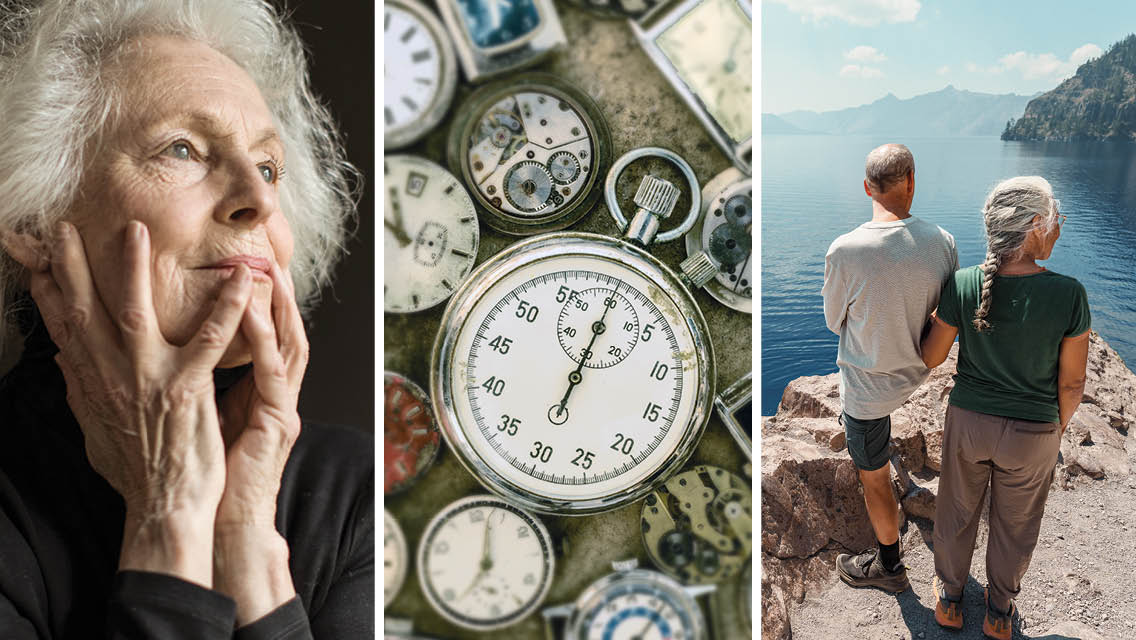For decades, top executive coach, speaker and best-selling author Richard Leider has led annual walking trips through Tanzania with small groups of clients he has come to call “inventurers” — individuals who adventure inward through outdoor experience.
On one recent African journey, Leider and his companions found themselves sitting around a campfire with a collection of elders from a tribe of hunter-gatherers known as the Hadza. Still living and working just as their ancient ancestors did, the Hadza reside on the edge of a primeval baobab tree forest, where an intimate, time-tested understanding of the natural world is a prerequisite for survival.
Unlike Westerners, who live in a youth-oriented culture that tends to marginalize and ignore older people, the Hadza tribe view their elders as vital, invaluable resources — people who can be counted on for guidance, insight, experience and direction. When senior members of the clan come together to share their wisdom, younger members of the Hadza form a larger circle around them, leaning forward and listening carefully to drink in their knowledge.
As the flames of one evening’s fire morphed into smoldering coals, one Hadza elder asked Leider, “Who are the elders of your tribe?” Leider found himself stumped. He also found himself intrigued — intrigued enough to turn his resulting search for answers into a new book: Claiming Your Place at the Fire: Living the Second Half of Your Life on Purpose. The book functions as a sort of epilogue to Leider’s earlier career-oriented works, including The Power of Purpose, Whistle While You Work and Repacking Your Bags, an international bestseller published in 15 languages.
“My tribe? What is that? My elders? Who are they?” Leider writes in the book’s prologue. “The very concept of ‘elder’ for our tribe — contemporary men and women in Western industrialized society — seems foreign. And yet it is clear to me that the question begs for an answer.”
Soul Search
In Claiming Your Place at the Fire, Leider invites readers who have passed through the first half of their lives to examine both the value of having elders and the importance of becoming one.
“New elders,” in Leider’s parlance, are those who choose to “live the second half of their lives in ways characterized by an aliveness and vitality that is grounded in a deep sense of purpose.” In pondering new elderhood, the author asks aging readers, including a giant tribe of baby boomers, to reflect on four central questions: Who am I? Where do I belong? What do I care about? What is my life’s purpose? The idea, says Leider, is to catalyze a proactive pursuit of the qualities that engender a vital, rewarding second half of life, not just for the satisfaction of the individual, but also for the betterment of society.
Throughout the book, fire is used as both an inspirational metaphor and organizing principle. Leider’s explorations center on the “four flames” he sees as intrinsic to meaningful, satisfying, principle-centered work:
- The flame of identity, where readers recall their own stories as a first step in visualizing a fresh future.
- The flame of community, where finding a place in the wider world can lead to a new sense of interpersonal intimacy.
- The flame of passion, which can help a person renew his or her life’s calling.
- The flame of purpose, which is central to finding a way to use creative expression as an engine of change.
Leider stresses that these four flames, which are described further in excerpts below, are not distinct from one another. “They dance together,” he notes, “in pairs, in trios, and as one.”
In encouraging us to consider the four flames and the essential role each one plays in creating a sense of meaning and satisfaction, Leider also effectively models the role of a “new elder” — guiding future generations to live and work more purposefully so that in the second half of their lives they, too, may claim their place at the fire.
The New Elder
Excerpted from Claiming Your Place at the Fire, by Richard Leider and David Shapiro
Many midlifers, being members of the “baby boom” generation, have been among those who have celebrated youth most enthusiastically. Now, though, finding ourselves no longer young — chronologically — we wonder about this emphasis on all that is new and fresh. We wonder about our place in the world and all that we have to offer as a result of our life experience.
What strikes us vividly about this is the degree to which the elders in traditional societies earn and accept the respect they are given. It’s not just that they are acknowledged by their people; that is a given. As importantly, they claim themselves as vital resources for their communities. Becoming an elder is, for them, an active step that involves staking out a place of power that one has achieved.
We see this dynamic represented clearly in the places that individuals take around the traditional fire. A person seated close to the flames is expected to have something valuable to bring forth — and must take the initiative to do so. In this way, he or she claims that place of respect at the fire.
This idea of “claiming” one’s place at the fire is an essential element in owning our power. But it is a missing piece in the role of the elders in our society. Too many of us have accepted, at least to some degree, our culture’s picture of aging.
But many of us are also now realizing that it is time for us — individually and as a group of people in the second half of our lives — to create a new picture of vital aging. It is time for us to become new elders.
New elders are people who use the second half of life as an empty canvas, a blank page, a hunk of clay to be crafted on purpose. These are people who never stop reinventing themselves.
For a world-renowned example of new elders at work in the world, we think of Jimmy and Rosalynn Carter. By teaching Sunday school, building low cost homes for Habitat for Humanity, and working for reconciliation in fledgling democracies, the Carters have committed themselves to continual reinvention through giving and growing. They are putting to use the deep wisdom they have developed over their long and useful lives. They are experiencing a sense of liberation that only comes to us when we have discovered who we truly are and how best to express that.
The 4 Flames of Vital Aging
In our earlier book, Repacking Your Bags: Lighten Your Load for the Rest of Your Life, we developed a definition of the “good life” that included four components: place, people, work, and purpose. We defined the good life as “living in the place you belong, with people you love, doing the right work, on purpose.”
In the second half of life, the same questions that drive our conception of the good life during the first half inevitably return. Who am I? Where do I belong? What do I care about? What is life’s purpose? Only now, in the second half, we have a unique opportunity to be the author of our own story. We have a chance to rewrite it, rather than simply replicate the first half.
With the four principles of the good life in mind, we have been able to identify four common principles among those seasoned citizens who are becoming new elders — individuals who are living on purpose in the second half of their lives.
These principles have become apparent, as we’ve observed new elders among us in action. Their choices, behaviors, and ways of moving through the world have enabled us to identify the “four flames of vital aging.”
1) The Flame of Identity: Recalling Our Stories
Principle: Wisdom
Firestarter Question: Who Am I?
New elders harvest and transfer the wisdom of the past into the present. They know the important narratives of their culture, whatever that culture is.
The great writer-theorist Joseph Campbell noted that “The first requirement of any society is that its adult membership should realize and represent the fact it is they who constitute its life and being … and on which that society itself must depend for its existence.”
Elders teach by story. But it isn’t simply recalling stories about “the good old days.” Rather, it is an ability to touch the lives of others through their own experiences in a manner that brings it alive in the present, through the past.
2) The Flame of Community: Redefining Our Place
Principle: Intimacy
Firestarter Question: Where Do I Belong?
New elders know where they belong in the world; they have a powerful sense of place — where they have come from, where they are, and where they are going. Consequently, they are able to reaffirm who they are for the journey ahead; grounded in the rich history of their first half, they feel alive to the challenges of the second half.
We must ask ourselves: What makes a place “home”? And what can we do to create a sense of sacred space for the
second half of life?
3) The Flame of Passion: Renewing Our Calling
Principle: Caring
Firestarter Question: What Do I Care About?
New elders care passionately about those who follow in their footsteps. They find deep satisfaction in giving their gifts in new ways that serve others rather than just themselves. And they accept this as a critical responsibility of their elderhood.
Consequently, new elders are all about “giving it away.” They know that people are strong not in proportion to what they can hold on to, but rather, according to what they can give up.
This doesn’t necessarily mean they are free-spending philanthropists when it comes to money; it does, however, usually mean they are extremely generous with advice, counsel and support. While elders may hold important positions in life, they realize that real power stems from the willingness and ability to share it with others.
They see wisdom as something that is inherent within everyone and, like the ancient philosopher Socrates, are passionate about helping to inspire that depth of wisdom within those around them.
4) The Flame of Meaning: Reclaiming Our Purpose
Principle: Meaning
Firestarter Question: What Is My Legacy?
New elders know “why they get up in the morning”; and it isn’t just because their alarm clock goes off. As a matter of fact, for many new elders, the alarm that dragged them out of bed for so many years has been permanently retired. Freed up from imposed schedules, they now find the freedom to make their own. And with that freedom, they are enthusiastically greeting the day, fired up about all they can do at last.
These new elders burn with the beacon that guides them: their purpose. They light the way for themselves and for others to follow. The incandescence of such elders is powerfully illuminating. As they forge ahead, lit by the fire of purpose, they light the way into the future.
Wise Choices
The four flames of vital aging represent choices available to all of us. We can take those steps no matter our age or what stage our lives are in. And while they are no doubt choices that lend themselves more naturally to those in the second half of life, new elders are by no means elderly.
Now, more than ever, we need energetic new elders among us. New elders are natural resources essential to the family, the community, the organization, and the Earth. We can’t wait for the wise ones to come. We must become them. It is incumbent upon us to accept the mantle for ourselves, our loved ones, and the planet as a whole.
This article has been updated. It originally appeared as “Rekindling Your Fire” in the July/August 2004 issue of Experience Life.






This Post Has 0 Comments